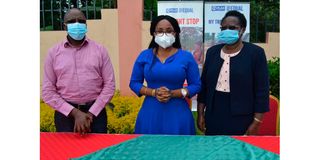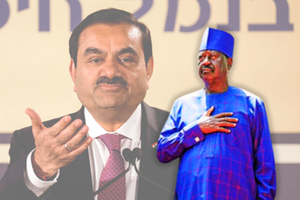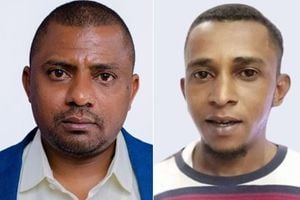Gender agenda: Too little to celebrate in Laikipia, Tharaka Nithi counties

From left: Plan International's Charles Muliu, Tharaka Nithi County Gender Executive Sheila Kiganka and Gender Officer Mary Mugambi. The county recently enacted two policies to boost gender activities in the region.
What you need to know:
- Though there exists a docket of Education, Gender, Youth, Tourism, Sports and Culture in Tharaka Nithi County, there are no sub-county and ward gender offices.
- In Laikipia, the county government has spent Sh50.6 million towards rolling out gender-based programmes since 2015.
In Tharaka Nithi and Laikipia counties, there is too little to report.
Though there exists a docket of Education, Gender, Youth, Tourism, Sports and Culture in Tharaka Nithi County, headed by executive member, there are no sub-county and ward gender officers.
The County Assembly recently enacted two policies; Gender Mainstreaming and Anti-Female Genital Mutilation laws that are set to boost gender activities in the region.
The county Education, Gender, Youth, Sports, Tourism and Culture executive, Sheila Kiganka who unveiled the policies at the county headquarters in Kathwana, said the two policies contain a raft of measures, including formation of the ward anti-FGM policy committees to spearhead the fight from the village level.
“Before enactment of these policies, it was impossible to set aside funds, in the budget, for gender exercises such as sensitization of the dangers of FGM,” said Ms Kiganka.
The policies’ vision is to eradicate female genital mutilation (FGM), child marriage and other forms of gender-based violence (GBV), and improve the quality of life for women and girls in the region.
The policies also state that victims of GBV should receive necessary medical treatment and psychosocial support.
Meanwhile, in Laikipia, the county government has spent Sh50.6 million towards rolling out gender-based programmes since 2015.
County Chief Officer for Education, Sports, Youth and Social Services Evans Kamau told Nation.Africa that the funds were spent to register women self-help groups and capacity building.
Street children
Mr Kamau said they have also used the resources to rehabilitate street children and cater for their education as well as supporting persons with disabilities at the grassroots.
In the current financial year – 2021/2022 – the department received a budgetary allocation of Sh12 million.
The gender department in the county is under the directorate of social services and headed by a director and an assistant director.
It has community development assistants (CDAs) in every ward, who are mainly tasked to assist different groups to access affirmative funds and identify vulnerable members of the community that need help.
“We have a fully-fledged gender department, which offers capacity building to various self-help groups at the grassroots and also offers conflict resolution. We have been offering scholarships to street children and other vulnerable learners in the community,” Mr Kamau said.
The chief officer, however, claims that the majority of their operations have been hindered by lack of adequate budgetary allocation.





